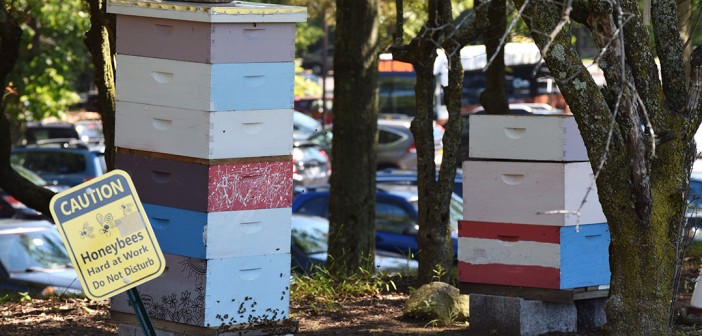After being awarded $2,000 from Lehigh’s Green Fund grant, a one-time grant awarded to student groups for promoting a “greener” Lehigh, the Bee Keeping club acquired new queen bees for its hives.
The set of bees plus the queen can cost anywhere from $150 to $200. Shipley Foltz, ’16, the club’s treasurer, said the club used some of the grant money to purchase the queen.
“Maintaining the club itself does not cost a lot of money,” Foltz said..
Club Vice President Maria Cuenca, ’16, said queen bees are mass bread in the South, which is where the club’s bees came from.
“When the queens get shipped, they are sent with about 300 other bees,” Cuenca said. “They are kept alive by just a small bottle of sugar and water. When we eventually get the package we just dump the bees into our hive and let them settle.”
Within the hive, the queen bee is solely responsible for laying the eggs. The nursing and worker bees in the hive are also female, but none of them reproduce. In addition, the nursing and worker bees are the only bees that leave the hive. Drone bees are the only male bees in the hive, and their only responsibility is to mate with the queen.
The club also performed its first honey harvest this summer. The club made the harvest an educational process with a local preschool.
“We were able to educate the students about the bees, while they were also able to watch us harvest the honey,” Cucena said.
Club President Katherine Ballen, ’16, said the club is unsure of what it plans to do with the three jars of honey it harvested. She mentioned selling the honey in farmers’ markets and putting the proceeds back into the club, or donating it to burn victims.
This semester the club is geared toward becoming a more educational group. Foltz said the group’s goal for the semester is to educate students about bees and make them more aware of the fact that honey bees are dying out at an extremely fast rate. Bee farmers are losing up to 50 percent of their hives due to Colony Collapse Disorder.
The club also hopes to gain as many new members as possible. Ballen said she hopes to have any interested students up to Mountaintop Campus to see the hives.
The Bee Keeping Club is hoping to use this semester as an opportunity to teach as many students as possible about bees, pollination and how it affects the environment. The club is hoping to host workshops throughout the winter, when it is unable to visit the hives due to the weather. Some possible events include visits from the Lehigh Valley Bee Keeper’s Association, speakers and apple picking trips just to see how bees affect everyday life.






Comment policy
Comments posted to The Brown and White website are reviewed by a moderator before being approved. Incendiary speech or harassing language, including comments targeted at individuals, may be deemed unacceptable and not published. Spam and other soliciting will also be declined.
The Brown and White also reserves the right to not publish entirely anonymous comments.